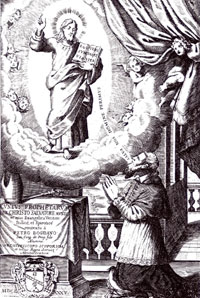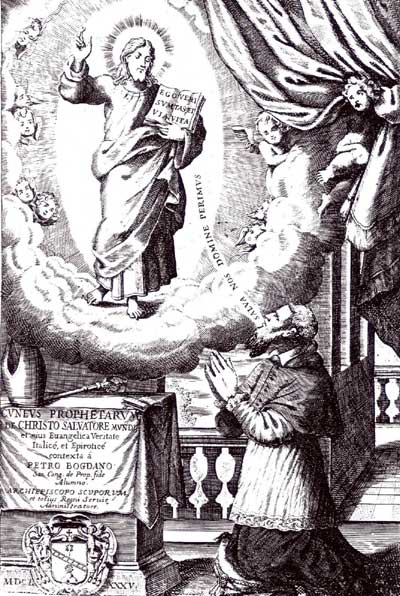Pjetër BOGDANI

THE SONGS OF THE TEN SIBYLS
The Cumaean Sibyl
Peace and abundant fruit will there be from Heaven
For six years before his birth and, thereafter,
For another six will it know no end on earth.
Oh, wonder! For the wolf, the sheep and the lamb will dine
Together; the Son of Man and the dragon will live
Side by side without fear, without tears, or cries, or lamentation;
The lynx will spare the goats and kids,
For Our Lord will guard and raise them in peace.
[Sibila Cumea, from Cuneus
Prophetarum, Padua, Typographia Seminarii 1685, p. 161,
translated from the Albanian by Robert Elsie]
The Libyan Sibyl
He arrives as a man among mortal men,
To save the world with his own death
And passing by, to heal wounds without any balm,
To give sight to eyes, hearing to ears,
Proper movement to lame legs, without payment, without gold,
Expelling idols and the reign of death among us;
An only son, loved by his Mother,
Returned from the grave, safe and sound,
Clothed by the sun and shod by the moon,
A crown of stars circling his head.
The Maiden Mary, fairer than a zana,
Will receive her tender lad Jesus in her arms
To the envy of the Jews and the pagans
Who, plotting in council together,
Set forth to expel the lad Jesus,
Giving him no respite nor earthly place.
[Sibila Libica, from Cuneus
Prophetarum, Padua, Typographia Seminarii 1685, p. 162-163,
translated from the Albanian by Robert Elsie]
The Delphic Sibyl
I weep, wretched me, a loud lament
For Christ lying on the ground, drubbed and badly disfigured,
Given lashes, beatings, poison and vinegar,
His body wound-battered and besmirched,
Israel on earth left no iniquity undone.
With a spear still piercing his head,
They laid him lifeless in the lap of his mother,
Rending her heart to pieces.
[Sibila Delfica, from Cuneus
Prophetarum, Padua, Typographia Seminarii 1685, p. 164,
translated from the Albanian by Robert Elsie]
The Persian Sibyl
A voice from the mountains cries out in the wilderness
To carry the gospel, to pave for the world the path
Of righteousness, to preach forgiveness of sins,
And baptism. In this life
It will bring salvation to those who renounce lies and deception.
They will find their place in paradise, if they wish to,
By crushing the head of that inner beast,
By doing good deeds and by going often to church.
[Sibila Persica, from Cuneus
Prophetarum, Padua, Typographia Seminarii 1685, p. 165,
translated from the Albanian by Robert Elsie]
The Erythraean Sibyl
Thus sings and writes the Ionian Sibyl:
The blazing wind from the heavens burns trees and stones,
Spreading throughout the world,
Instead of water, the springs well with blood,
So arid is it that even the seas dry up
As the world is consumed like a torch,
Emerging from the clouds, Christ on high
Descends irately to expel evildoers below,
Many wretches there suffer badly,
Seared to ashes their souls, flesh and bones,
They and their cohorts pay the price for having done evil,
Sulphur, tar and lead all combined,
Snow and ice are laid in their beds,
And never are they allowed to leave,
Forever and ever, inconsolable pain,
Forgotten by Our Lord and the saints,
Damned be their idols, Muhammad, prophet of Allah,
Calvin, and Luther who deceived them,
May they be consigned to serpents and toads,
May the she-wolf consume for her meal the hearts
Of those who have trifled with Hell,
Who have eaten meat on a Friday, day of fasting,
And you who unthinkingly have abandoned the faith,
Gullible, you have fallen for lies,
Pay attention to where you may be heading,
Yes, repent in this life,
Confessing your vain undertakings,
Oh Man, what you have accomplished are but arrows,
Illusion, jealousy and envy. Weep for yourself.
[Sibila Eritrea, from Cuneus
Prophetarum, Padua, Typographia Seminarii 1685, p. 166-168,
translated from the Albanian by Robert Elsie]
The Samian Sibyl
Oh Zion, loftier than Pashtrik, mountain of Prizren,
We worship you, for from you will emerge the law.
When gentle Christ gave sweet pleasure to the apostles
With beloved communion and holy sermons,
And the Maiden, sent to you from on high,
Gave birth to the Son of Man, who taught us,
Then the Jews, who took your Godhead, meant for them,
Planted on his head a crown of thorns.
[Sibila Samia, from Cuneus
Prophetarum, Padua, Typographia Seminarii 1685, p. 169,
translated from the Albanian by Robert Elsie]
The Cumanian Sibyl
As Isaiah says, before the stem opens,
The infant flower shall come forth out of the Root of Jesse,
Like a white lily in the springtime,
Or as a hyacinth in April sprouts from the earth,
God himself promised this to us many times,
The ancient synagogue will free itself of the knot,
Assuming a pure name fashioned of words.
Thus sings and speaks our Sibyl in verse.
[Sibila Cumana, from Cuneus
Prophetarum, Padua, Typographia Seminarii 1685, p. 170,
translated from the Albanian by Robert Elsie]
The Hellespontic Sibyl
The Father gives birth to the Son in his own image,
The two, with the beloved Holy Ghost, breathe
Upon the world for its salvation, which conveys grace.
Whosoever wishes to see heaven, may he thus worship the Divine
And be freed of all his sins.
In his heart and on his brow may he honour the Cross
Upon which the second figure of the Trinity
Was nailed, overwhelmed by this life.
[Sibila Elespontica, from Cuneus
Prophetarum, Padua, Typographia Seminarii 1685, p. 172,
translated from the Albanian by Robert Elsie]
The Phrygian Sibyl
When blessed Christ perished, covered with wounds,
Stones and trees fractured, and the temple's canopy split in
two,
Darkness shrouded the earth for three days,
The sun and the moon were both bathed in blood,
The heart of the world groaned in sorrow.
Many souls veiled themselves in flesh, and then,
After three days, they rose to heaven with Christ,
If any have done evil, then later they will suffer.
[Sibila Frigia, from Cuneus
Prophetarum, Padua, Typographia Seminarii 1685, p. 173,
translated from the Albanian by Robert Elsie]
The Tiburtine Sibyl
After burying the Old Testament itself,
And leaving death and slavery behind him,
Like a lofty eagle, Christ crossed over to heaven.
Written in his own blood for you, oh Man,
He illuminated paradise, and comforted all souls,
Promising to return later,
With all the saints, swathed in light,
To judge in righteousness good and evil.
[Sibila Tiburtina, from Cuneus
Prophetarum, Padua, Typographia Seminarii 1685, p. 173,
translated from the Albanian by Robert Elsie]
|
BACK


![]()